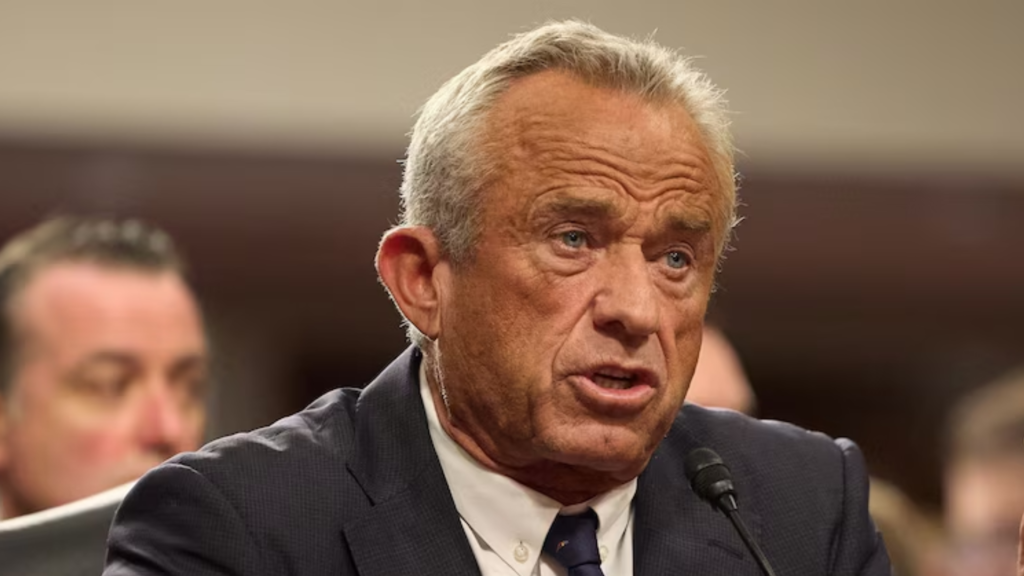
On Thursday, the Senate confirmed Robert F. Kennedy Jr. as the next Secretary of the Department of Health and Human Services (HHS). The final vote was 53-47, with Senator Mitch McConnell voting against Kennedy’s confirmation. Earlier in the week, McConnell had also opposed the confirmation of Tulsi Gabbard as Director of National Intelligence.
Kennedy’s confirmation process cleared its final hurdle on Wednesday when the Senate voted in favor of invoking cloture by the same 53-47 margin.
This procedural vote ensured that the nomination would advance to a final vote on the Senate floor. Earlier in February, the Senate Finance Committee had approved Kennedy’s nomination with a narrow 14-13 vote, signaling a closely contested confirmation process.
During the confirmation hearings, Kennedy faced tough questioning from Democratic lawmakers regarding his views on vaccines, an issue that has long been a focal point of his career. Senator Rand Paul (R-KY), a physician and staunch advocate for medical freedom, pushed back against what he described as an oversimplified debate on vaccines.
Today, at @RobertKennedyJr's HELP hearing, I made it clear that we need medical freedom.
— Senator Rand Paul (@SenRandPaul) January 30, 2025
There's such a belief in submission.
"Submit to the government. Do what you're told."
There is no discussion. There ought to be a debate.
RFK Jr. has my vote. MAHA! pic.twitter.com/F0AnthzFHf
“Discussion over vaccines is so oversimplified and dumbed down that we never really get to real truths, and it’s why people up here are so separated from real people at home,” Paul stated during the hearing.
“I’m pro-vaccine, but I’m not a one-size-fits-all person. I chose to wait on my hepatitis B vaccine, and we did it when they went to school. Does that make me an awful person?” Paul added, criticizing lawmakers for what he saw as an unquestioning belief in government mandates.
“These are the nuances you’re unwilling to talk about because there’s such a belief in submission. Submit to the government. Do what you’re told. There is no discussion.”
When questioned about a 2019 measles outbreak in Samoa, Kennedy clarified his stance on vaccines, saying, “I support the measles vaccine, I support the polio vaccine, I will do nothing as HHS secretary that makes it difficult or discourages people from taking either of those vaccines.”
Former President Donald Trump praised Kennedy when announcing his nomination. “I am thrilled to announce Robert F. Kennedy Jr. as The United States Secretary of Health and Human Services (HHS). For too long, Americans have been crushed by the industrial food complex and drug companies who have engaged in deception, misinformation, and disinformation when it comes to Public Health.”
Trump further elaborated on his decision, emphasizing Kennedy’s commitment to public safety and transparency. “The Safety and Health of all Americans is the most important role of any Administration, and HHS will play a big role in helping ensure that everybody will be protected from harmful chemicals, pollutants, pesticides, pharmaceutical products, and food additives that have contributed to the overwhelming Health Crisis in this Country. Mr. Kennedy will restore these Agencies to the traditions of Gold Standard Scientific Research, and beacons of Transparency, to end the Chronic Disease epidemic, and to Make America Great and Healthy Again!”
Kennedy, a former Democrat who later switched to an independent affiliation, had previously launched a 2024 presidential campaign before ultimately withdrawing from the race and endorsing Trump.
His selection as HHS Secretary signals Trump’s commitment to reforming federal health agencies and tackling long-standing concerns over regulatory oversight in the pharmaceutical and food industries.
Throughout the confirmation process, Kennedy’s views on vaccine safety and pharmaceutical industry practices were heavily scrutinized. While he has been an outspoken critic of certain vaccine policies and corporate influence in public health, he has also stated his support for scientifically proven vaccines, emphasizing the need for rigorous safety standards and informed medical decision-making.
The confirmation of Kennedy is expected to have significant implications for the direction of health policy in the United States. His leadership at HHS will likely focus on increasing transparency in regulatory agencies, reassessing vaccine mandates, and addressing chronic disease prevention through improved oversight of food and pharmaceutical industries.

